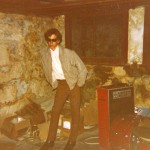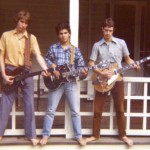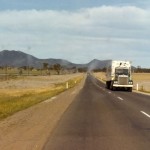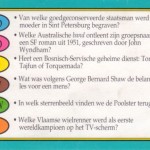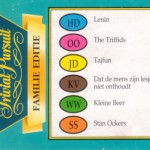The Triffids were born to two teenagers in the Perth of the late 70’s – a weird little historical and geographical interstice if ever there was one. This was the Perth of Norman Gunston, clear blue skies, watersports, all-night TV horrorthons, Hungry Jacks, the WAFL, the P76, the Nookanbah episode, and more watersports. Politics was a distant rumble. There were slim pickings for precocious Stooges/Velvets/Eno fans. But anything was fair game to escape the heat and boredom of the world’s most isolated capital city perched on a thin strip of arable coast between the desert and the Indian Ocean.
Seeing the Sex Pistols make a viscid appearance on the ABC TV programme Weekend Magazine was a singular spur, encouraging us to pick up tape recorders, biros and cheap musical instruments. But instead of the simple background of YewKay Punk our bed of influences tended to Patti Smith, Kraftwerk, Television and early Talking Heads.
On a rotating bedroom/loungeroom basis, we home-recorded cassette “albums” of original material and sold them in local record stores, collecting 80-90 songs before even thinking of releasing a vinyl disc.
Although ostensibly gawky, underage misfits, we immersed ourselves in the Perth Punk scene dominated by the Victims and the Scientists nee the Cheap Nasties. We quickly addicted ourselves to releasing records – singles and EP’s. Some of these curios (notably the toe-curlingly, buttock clenchingly twee Stand Up/Farmers Never Visit Nightclubs) are now fabulously expensive collectors’ items. Although not without a certain adolescent charm, the fact that they were recorded in Perth’s jingle studios informs their ultra-bubblegum sound quality.
In 1982 The Triffids began what was to be eight years of continually moving base around the globe. First (on 2/1/82) came Sydney by Greyhound Bus (really). We became intimate with the Nullabor, the Hume, a Toyota Hiace, and several unfortunate kangaroos. And with each other. We set up communal households, some more hygenic than others, in Darlinghurst, Redfern, Fitzroy and St Kilda. For a mere $150 a night our services as a support band were procured by the likes of the Reels, Sunnyboys, Church, Hunters and Collectors…and the Uncanny X-men. There were flea-dive residencies, 21sts, student balls, high school dances, art galleries, adult comfort rock venues, and the opening of various envelopes. We ploughed the Triffid riches back into recording an ambitiously arranged debut LP called Treeless Plain, then further mini LP’s, singles (and accompanying film clips) on Sydney’s Hot label.
By 1984, after extensive nationwide touring and settling on a lineup with a distinctive frontline sound of pedal steel, hammond organ, violin and guitar, The Triffids now had both critical recognition and a thriving audience – at least as much as an Australian independent band could cheerfully expect. But since we had already hauled ourselves 3000 miles from our hometown, we decided to bung on some more noughts and head off for Europe and the UK. This wasn’t meticulously planned; it was just less trouble than getting US work visas.
By this time our self-confidence was not exactly anaemic and the UK shows we did in tiny clubs and stadiums (supporting the likes of Echo and the Bunnymen) were aggressive, cathartic affairs. Even the ballads were confrontational. A grassroots following soon appeared and we proceeded to tour virtually every European country, finding specific pockets of popularity in the oddest of locations: Holland, Greece, Scandinavia, Ireland. And we realised we had been touched by the blessed hand of Spinal Tap when we foiund ourselves to be certifiably…big in Belgium (a mystery that endures to this day). We were introduced to the delights of the Summer Eurofestival circuit, performing at Glastonbury, Pinkpop, Waterpop, Seinojoke, Roskhilde (40,000), T&W Belgium (35,000) and den Haague’s Parkpop (pushing 100,000).
From the vantage point of Australia it looked as though The Triffids had a dream run with the European press. Thankfully it was a little more modest. Actually, it was precisely the fact that reactions to us were not always hysterically and unanimously favourable that gave us welcome breathing space. We always managed to find a few journalists willing to relieve Triffids hype by declining to find anything messianic in us.
On the recording front things were busy. Following a particularly violent sonic period which produced the Field Of Glass EP, Evil Graham Lee’s country influence was asserted on You Don’t Miss Your Water. In the second half of the ’80’s The Triffids completed a trilogy of studio LP’s that fulfilled most of our widescreenstudio ambitions, both in terms of songwriting storytelling and musical atmosphere. Born Sandy Devotional (1986), Calenture (1988), and The Black Swan (1989) also formed a sometimes embarrassingly honest epic account of the band’s peculiar pilgrimage. For many stubborn and ornery fans, however, the neanderthal technology employed on the “woolshed” album In The Pines (1987) was just what the Luddite doctor ordered. Everyone was blown away, however, by the stunning crowd noises on the surprisingly zesty contractual-filler live album Stockholm (1990).
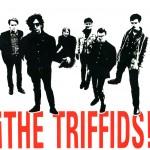 The entire period was interspersed with several tours and extended sojourns in Australia, and several psychotic southern summers of songwriting and recuperation. In 1986 we found ourselves at last on the holy mount of bigtime Oz rock as part of the infamous Australian Made bachannalia. Time was even found for a quick fling in America in 1989, but by this stage of the decade it was obvious to most coolheaded observers that a beautiful era was at an end. The last Australian shows were in late 1989, and the final Triffids entertainment booking was, appropriately, in front of a few miserably frozen stragglers in a snow resort in Jindabyne. Well, actually it was Canberra ANU, but let’s not spoil a good ending.
The entire period was interspersed with several tours and extended sojourns in Australia, and several psychotic southern summers of songwriting and recuperation. In 1986 we found ourselves at last on the holy mount of bigtime Oz rock as part of the infamous Australian Made bachannalia. Time was even found for a quick fling in America in 1989, but by this stage of the decade it was obvious to most coolheaded observers that a beautiful era was at an end. The last Australian shows were in late 1989, and the final Triffids entertainment booking was, appropriately, in front of a few miserably frozen stragglers in a snow resort in Jindabyne. Well, actually it was Canberra ANU, but let’s not spoil a good ending.
David McComb 1995

